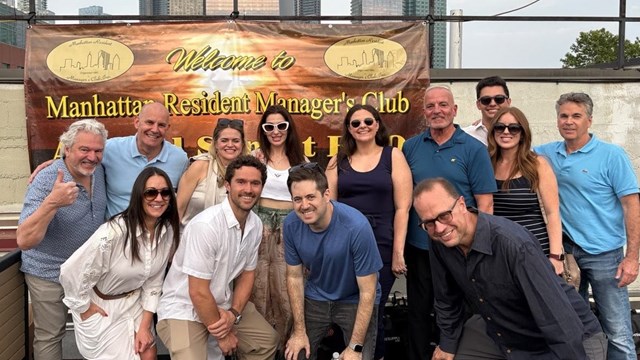
For most New Yorkers, the search for housing is the least favorite part of the New York experience. If the size is right, the price is wrong; if the price is right, the neighborhood's wrong. And then there's that hideous bathtub in the kitchen. In an area as popular and populous as metropolitan New York, finding a unit that meets all your needs is darn near impossible. The Real Estate Board of New York (REBNY) hopes to change all that.
Founded in 1896, REBNY began as the state's first real estate trade association, created in response to New York's 1890s building boom, which was necessitated by the mass influx of people and businesses into the area. Since then, REBNY's ranks have grown to include not just brokers but 12,000 owners, builders, managers, banks, insurance companies, pension funds, real estate investment trusts, utilities, attorneys, architects, marketing professionals and other important real estate players.
REBNY's mission is to promote industry policies to the public and to legislators. The organization strives to encourage the development and renovation of commercial and residential real property, and enhance the city's appeal to investors and residents.
The association is governed by a 100-person Board of Governors headed by a chairperson. The membership is divided into six divisions organized by function: The Owners and Builders Division, consisting of several committees involved in the construction process; The Commercial Brokerage Division, whose members study and exchange information on demands for commercial space, prevailing market rates and neighborhood trends; The Residential Brokerage Division, which deals with the sale and rental of residential property; The Management Division, which includes leading commercial and residential property managers and advocates on building codes and regulatory issues; The Allied and Associates Division, which is composed of companies and individuals who perform services or provide products for the real estate industry; and The Institutional Owners Division, which gives institutions such as banks, investment houses, insurance companies and pension funds an opportunity to shape public policy. The four largest divisions are governed by their own board of directors.
"For the most part, our members are extraordinarily civic-minded," says Marolyn Davenport, REBNY senior vice president. "Their thinking is, 'if it's good for the city, it's good for the industry.'"
REBNY's civic-minded members walk the walk and talk the talk. Members created The REBNY Foundation, a non-profit corporation that enables them to engage in charitable pursuits, such as absorbing the aftereffects of the 9/11 disaster.
"After 9/11, members wanted some way to help children who were affected by the tragedy during the holidays, throwing parties and giving gifts. We did that through the REBNY Foundation," Davenport says.
REBNY members also sit on community boards and organize fire safety seminars; sponsor liberal arts college graduates training to become teachers in the public schools; serve as Principals-for-a-Day in those schools; and serve on the boards of New York's major cultural and health care institutions.
The New Addition
That same sense of civic pride and desire to advance the industry governs most of REBNY's programs and policies, including the implementation of ResidentialNYC, REBNY's new Multiple Listing Service that currently features 4,000 exclusive listings from 60 firms throughout the five boroughs.
"It's the most accurate and comprehensive website of its kind," says Steven Spinola, REBNY's president for the last 21 years. "Seven or eight years ago, requiring members to share their listings was unheard of. The site is a major accomplishment."
"It has so much information. It's a huge database that's really easy to use," Davenport adds. "Our feedback has been really great."
The initial planning stages of the website were rocky; the site went through several generations. Stephen Kliegerman, the executive director of Development Marketing at Halstead Property, LLC and a former chairperson of REBNY's Ethics Committee, remembers the controversy well. "We couldn't agree on what kind of advertising it should have, who should run it, what information it should include."
REBNY members tried to be as inclusive as possible. "We had many meetings with the brokerage firms; they were very involved in the planning," Davenport says. But when have hundreds of New Yorkers ever agreed on anything?
"Finally a year ago, we decided that we needed a portal like this that would present our information in a very streamlined way," Kliegerman remembers. "We organized it so no one would have a competitive advantage. It's the only website of its kind that uses real, exclusive listings."
REBNY abandoned initial plans to require all member brokers to share their listings. "We didn't get everyone on board, so we just went ahead and did it. We figured that brokers would see it and want to be a part of it," Spinola interjects. "It really looks great."
On the Watch
ResidentialNYC isn't the only service that REBNY provides New Yorkers. The association's concern with the New York City housing situation has stimulated discussion with Mayor Michael R. Bloomberg's office regarding the development of single family homes, and low to middle income housing.
"It's essential to us as an industry to have a mix of housing throughout the city," Davenport says. "The whole economic landscape is critical to the Real Estate Board."
"It's a question of giving something back to the city," says Spinola, a former director of the city's economic development agency.
In that same vein, REBNY watches real estate legislation very closely to protect the interests of its members and the city's economic prosperity. When the 421-a tax abatement bill made its way through city and state government, REBNY was active in ensuring that the legislation effectively did what it was supposed to: encourage the building of affordable housing in the city. One of the ways the legislation accomplished this is through 80/20, a program that proposes that every participating new building sell or rent 80 percent of its units at market value and 20 percent at a low-income rate. REBNY is a big proponent of the 80/20 program.
The association was also actively involved in discussions of Local Law 11 (façade inspection) and Local Law 26 (commercial property concerns related primarily to emergency lighting and signage). The organization will continue to impact property legislation as it comes down the pike, Spinola says.
"If governmental bodies are looking to impose restrictions on us, someone needs to be there to make sure those restrictions are reasonable," says Kliegerman.
REBNY also provides other services to New Yorkers through its active Residential Management Council. The council reaches out to co-op and condo managers by making standard purchase applications, alteration agreements and building fact sheets available on the website.
Keeping it Fresh
Anyone involved in a professional association knows recruiting and retaining new membership is important to keeping an organization vital and strong. For REBNY staff, that means simply continuing down the same policy path and listening to the needs of its membership. REBNY members are offered a full complement of social activities, educational opportunities and member benefits to keep them interested and involved.
"At 12,000 members, we're at an all-time high. So we're just going to continue doing what we have always done. We just try to find out what members want and give it to them," Spinola says. "We try to understand the issues that affect the membership."
"The members kind of recruit each other, actually," Davenport says, commenting on REBNY's successful word of mouth in the community. "And we give them plenty of networking opportunities. We give people the chance to meet and exchange ideas." REBNY schedules industry lunches, awards breakfasts, golf and tennis outings, dinner dances and awards ceremonies, all organized by division.
"We have to break it up. You'd never be able to take all 12,000 of us out for breakfast," Davenport laughs.
REBNY also offers numerous courses and seminars: licensing and state-mandated continuing education courses, as well as special seminars that address timely topics such energy efficiency, emergency preparedness and ecological awareness. "It depends on what is new and current. Usually we have two or three seminars a month, sometimes more," Davenport adds.
REBNY's member benefits are extensive. The organization offers those who join health insurance, financial planning, and discounts on everything from periodicals to car rentals to computers to eye glasses to basketball seminars. REBNY also sponsors the Residential Member in Need Fund, which dispenses grants to those members facing hardship because of illness or family crisis.
The Future
The future for REBNY looks like the present: very rosy, according to Davenport. "Obviously, our future is very wrapped up in the new website," Davenport says. "I think it will transform the way people search for housing."
The organization's future, she says, is tied to the New York real estate market, which, unlike the rest of the country, is very solid.
"We have a very strong pipeline of new construction, both commercial and residential. There's been a lot of re-zoning here. Our market is very strong, very strong and growing," Davenport says.
Lisa Buscani is a freelance writer and performer living in Chicago, Illinois.





Comments
Leave a Comment